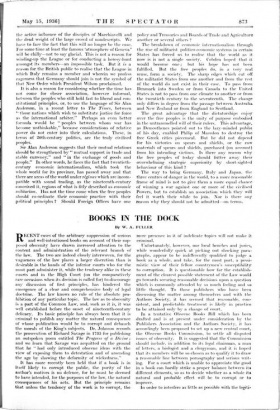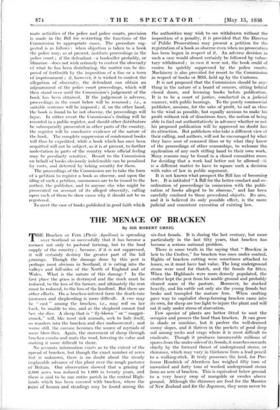BOOKS IN THE DOCK
By W. A. FULLER
RECENT cases of the arbitrary suppression of serious and well-intentioned books on account of their sup- posed obscenity have drawn increased attention to the content and administration of the relevant branch of the law. The two are indeed closely interwoven, for the vagueness of the law places a larger discretion than is desirable in the hands of the inferior courts who for the most part administer it, while the tendency alike in these courts and in the High Court (on the comparatively rare occasions when its decision is called for) to discourage any discussion of first principles, has hindered the emergence of a clear and comprehensive body of legal doctrine. The law knows no rule of the absolute pro- hibition of any particular topic. The law as to obscenity is a part of the Common Law, and, such as it is, it was well established before the onset of nineteenth-century delicacy. Its basic principle has always been that it is criminal to publish any matter the natural consequence of whose publication would be to corrupt and debauch the morals of the King's subjects. Dr. Johnson records the prosecution of Richard Savage in 1785 for publishing an outspoken poem entitled The Progress of a Divine; and we learn that Savage was acquitted on the ground that he " had only introduced obscene ideas with the view of exposing them to detestation and of amending the age by showing the deformity of wickedness."
It has more recently been held that if a book is in Itself likely to corrupt the public, the purity of the author's motives is no defence, for he must be deemed to have intended, for the purposes of the law, the natural consequences of his acts. But the -principle remains that unless the tendency of the work is to corrupt, the mere presence in it of indelicate topics will not make it criminal.
Unfortunately, however, our local benches and juries, while wonderfully quick at picking out shocking para- graphs, appear to be indifferently qualified to judge a book as a whole, and take, for the most part, a pessi- mistic view of their fellow countrymen's susceptibility to corruption. It is questionable how far the establish- ment of the clearest possible statement of the Law would go towards securing reasonable decisions upon a question which is commonly attended by so much feeling and so little thought. To those publishers who have been discussing the matter among themselves and with the Authors Society, it has seemed that reasonable, con- sistent, and predictable treatment is likely in practice to be attained only by a change of court.
In a tentative Obscene Books Bill which has been drafted and is at present under consideration by the Publishers Association and the Authors Society, it has accordingly been proposed to set up a new central court, the Obscene Books Commission, to settle all disputed issues of obscenity. It. is suggested that the Commission should include, in addition to its legal chairman, a man of letters, a biologist and a clergyman, and it is hoped that its members will be so chosen as to qualify it to draw a reasonable line between pornography and serious writ- ing. For a court which is unable to appreciate the good in a book can hardly strike a proper balance between its different elements, so as to decide whether as a whole its natural and probable effect will be to corrupt or to improve.
In order to interfere as little as possible with the legiti- mate activities of the police and police courts, provision is made in the Bill for restricting the functions of the Commission to appropriate cases. The procedure sug- gested is as follows : when objection is taken to a book the police may, as at present, institute proceedings in the police court ; if the defendant—a bookseller probably, or librarian—does not wish seriously to contest the obscenity of what he has been distributing, the matter can be dis- posed of forthwith by the imposition of a fine or a term of imprisonment ; if, however, it is wished to contest the allegation of obscenity, the defendant can obtain an adjournment of the police court proceedings, which will then stand over until the Commission's judgement of the book has been obtained. If the judgement is adverse, proceedings in the court below will be resumed ; i.e., a suitable sentence will be imposed ; if, on the other hand, the book is found to . be not obscene, the proceedings will lapse. In either event the Commission's finding will be recorded in a public register, and should other distributors be subsequently prosecuted in other parts of the country, the register will be conclusive evidence of the nature of the book. The complete suppression of condemned books will thus be expedited, while a book which has once been acquitted will not he subject, as it is at present, to further molestation in parts of the country where official feeling may be peculiarly sensitive. Resort to the Commission on behalf of books obviously indefensible can be penalised by costs, and deterred by taking security for them.
The proceedings of the Commission are to take the form of a petition to register a book as obscene, and upon the filing of such a petition, summonses are to be issued to the author, the publisher, and to anyone else who might be prosecuted on account of its alleged obscenity, calling upon each of them to show cause why it should not be so registered.
To meet the ease of books published in good faith which the authorities may wish to see withdrawn without the imposition of a penalty, it is provided that the Director of Public Prosecutions may present a petition for the registration of a book as obscene even when no prosecutio:i has been begun in respect of it. An adverse decision in such a case would almost certainly be followed by volun- tary- withdrawal ; in case it were not, the book could of course be quickly suppressed by the police courts. Machinery is also provided for resort to the Commission in respect of books or MSS. held up by the Customs.
It is not proposed that the Commission should be any- thing in the nature of a board of censors, sitting behind closed doors, and licensing books • before publication. It is to be a court of justice, conducted in a judicial manner, with public hearings. To the purely commercial publisher, anxious, for the sake of profit, to sail as close to the wind as possible, 'but equally anxious to make his profit without risk of disastrous fines, the notion of being able to find out authoritatively in advance whether or not his proposed publication will be approved no doubt has its attraction. But publishers who take a different view of their calling, and authors, will not be encouraged by what they have seen of censored films or by what they know of the proceedings of other censorships, to welcome the application of any such stifling hand to their own work. Many reasons may be found in a closed committee room for deciding that a work had better not be allowed—it is a different matter to have to square such a decision with rules of law in public argument.
It is not known what prospect the Bill has of becoming law. It is intituled "A Bill for the better conduct and co- ordination of proceedings-in connexion with the publi- cation of books alleged to be obscene," and has been carefully confined to those procedural objects. Its aim, and it is believed its only possible effect, is the more judicial and consistent execution of existing law.























































 Previous page
Previous page